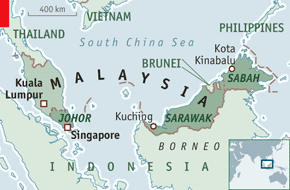Cracking open the fixed deposits

(The Economist) – The next general election will be decided far from the capital
Throughout Malaysia, seats are skilfully carved up along ethnic lines to benefit the ruling party, but the practice is particularly strong on Borneo. Constituencies there tend to be rural and cover huge areas, but hold relatively few voters, usually ethnic Malays or other, local ethnic groups friendly to the BN.
A THOUSAND or so kilometres east of what is called Peninsular Malaysia, across the South China Sea, lies the other bit of Malaysia, the states of Sabah and Sarawak. The two form the northern part of the island of Borneo, encircling the oil-rich mini-kingdom of Brunei. Most Malaysians know little about the remote territories (11 of Malaysia’s 13 states lie on the peninsula). Yet Sabah and Sarawak, out of all proportion to their small populations, contribute two essential ingredients to the running of Malaysia under the long-standing national government in Kuala Lumpur: oil and votes.
Royal Dutch Shell, the Anglo-Dutch oil giant, first started pumping oil out of the ground in Sarawak in 1910. Since Sarawak and Sabah joined Malaysia in 1963, they have sent an outsize share of oil revenues to the federal government’s coffers. That the petro-charged government has remained in the hands of the same political coalition, the Barisan Nasional (BN), since independence is also largely thanks to the same two states.
On the peninsula voters have gradually forced the coalition, led by the United Malays National Organisation and dominated by ethnic Malays, to loosen its grip. On Borneo, by contrast, the BN has maintained an electoral stranglehold. Indeed, Sabah and Sarawak are known as the BN’s “fixed deposits”. With the prime minister, Najib Razak, expected at any moment to declare a general election, the opposition coalition must find a way to raid those deposits if they are to oust the BN from power. As ever, the task looks daunting for the opposition and its leader, Anwar Ibrahim. Yet this time round, Mr Anwar’s foot soldiers have a secret weapon, a clandestine radio station.
The electoral arithmetic is simple. At the previous election, in 2008, which produced the best-ever result for the opposition, Mr Anwar’s coalition of parties, the Pakatan Rakyat (PR), won 82 out of 222 parliamentary seats. To take power this time, Mr Anwar needs to gain about 30 more seats. In just Sabah and Sarawak alone, 56 seats are up for grabs, a quarter of the total. In these states, the BN’s grip is near-total. In 2008 it lost two seats on Borneo (although an opposition party has since picked up another in a by-election in Sarawak). Tian Chua, an MP and strategist for the PR, acknowledges that to win the election his side must add ten or more seats in each of Sarawak, Sabah and the state of Johor, facing Singapore at the tip of the peninsula. In Johor, at least, the prospects look fair, but in Sabah and Sarawak the task is daunting. There, away from the cosmopolitan lights of Kuala Lumpur, the darker political arts hold sway.
One obvious way that the system works in favour of the ruling coalition is through the gerrymandering of constituencies. Throughout Malaysia, seats are skilfully carved up along ethnic lines to benefit the ruling party, but the practice is particularly strong on Borneo. Constituencies there tend to be rural and cover huge areas, but hold relatively few voters, usually ethnic Malays or other, local ethnic groups friendly to the BN. Potentially hostile voters such as ethnic Chinese, on the other hand, are lumped together into a smaller number of populous urban seats, where they are still often swamped by BN stalwarts. This way the BN maximises its number of seats with a minimum of voters. A local academic, Andrew Aeria, in a report submitted to the Sarawak parliament last year, underlined how the 16,000-odd voters in one rural constituency had as much clout as 67,000 voters in a semiurban one. Other countries attempt to equalise the number of voters in each constituency. The Malaysian constitution sanctions the gerrymandering.

In Sabah, which lies near the Philippines, there is a further refinement. Critics claim that hundreds of thousands of mainly Muslim Filipino immigrants have been given identity cards as an inducement to vote for the BN.
Read more at: http://www.economist.com/node/21556617

